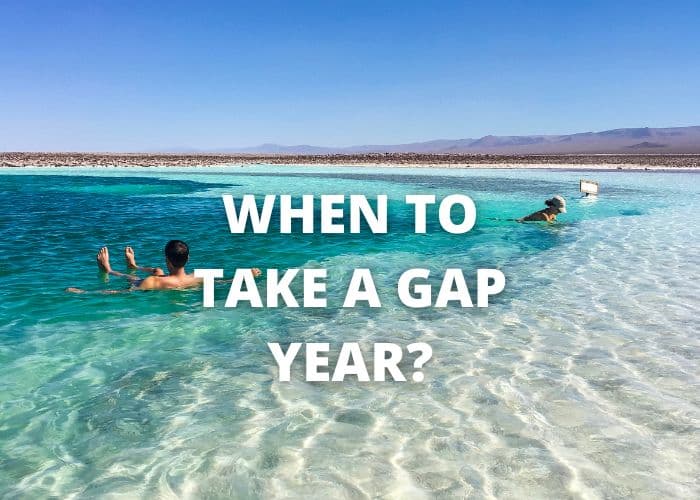Gap Year
When to Take a Gap Year?
Taking a gap year can be a great way to figure out your college major or explore other options. The time off from school allows you to travel and discover your personal interests. One of the best times to take a gap year is during the summer. Many top universities promote gap years and even offer scholarships for them. Here are some reasons why taking a gap year is a good idea. It can be expensive, but it’s worth it!

Expenses of a gap year
A gap year is a great opportunity to explore a new country and culture. It is also a good time to volunteer and intern, as well as to de-stress. However, it is important to consider that a gap year does not come cheap. If you want to take a gap year, it is important to save as much money as possible. Not only will this help you pay for the trip, but it will also teach you how to manage your money better.
Your biggest expense will probably be air travel between countries. However, it is possible to find multi-destination tickets, which cover several flights for one price. These tickets are often cheaper than booking tickets for each destination separately and are usually faster. One of the most inexpensive regions to travel is Asia, where tickets can be purchased for around $650.
Many students are drawn to a gap year because it offers an opportunity to gain valuable skills. It also gives them the opportunity to travel independently, work in a foreign country, or develop their leadership skills. Additionally, gap year programs can help students build skills that can be useful even if they don’t end up pursuing that particular profession.
Another advantage of a gap year is that it can provide you with an additional year of college. After a gap year, it can be difficult to get back into the swing of school and your peers. As a result, you can fall behind when you return to school and have trouble catching up with them.
Another option is a work placement year. While it may involve more money up front, it also offers the chance to explore a new country and city. You will have a chance to meet new people and experience new things, and you won’t need to worry about Expenses of a gap year.
Another way to save money while on a gap year is to limit the number of big purchases that you make. You may find it tempting to upgrade to the latest mobile phone or buy the latest luxury mattress, but delaying gratification can help you achieve your goal. It will be more fulfilling to achieve your gap year dreams if you are able to say no to a few things.
Before you leave for your gap year, decide where you want to go. If you can afford it, you may want to consider a destination that has cheap transportation and low cost of living. Many backpackers and students take their gap year in Southeast Asia or South Africa. There are many cheap activities and cheap lodging in these locations.
If you have plans to take a gap year, you need to talk with your school’s admissions office. They will be able to approve your plan and explain how the gap year will affect your financial aid. If you have no desire to go back to school after a gap year, you may have to sacrifice your financial aid.
Benefits of a gap year
Having a gap year offers many benefits. For example, you can get to experience a different culture and meet new people. A gap year can also help you learn to communicate well with a diverse group of people. Many businesses will look favorably on a resume if the applicant has spent time abroad. Plus, a gap year lets you relax and unwind. Many people stay in touch with their new friends for years after the program is over.
Another benefit is that it allows you to learn a new language. As the world’s economy continues to grow and globalize, it becomes increasingly important to learn a foreign language. Language learning is now promoted in more colleges, and many employers seek bilingual candidates. Learning a new language is also a great way to “rewire” your brain.
Another benefit of a gap year is that it offers a chance to develop skills that will be useful once you start working. These skills can include organization, resilience, and cultural awareness. Studies show that gap year graduates have higher rates of employment and higher satisfaction with their jobs. It also helps you build confidence.
While you are on a gap year, you can volunteer in your local community. Volunteering in a local food bank or animal shelter can be beneficial, and can help you meet new people. Volunteering can also help you find your identity. These are just some of the many benefits of a gap year.
Experts have described gap years as a modern-day rite of passage. They believe that this experience is crucial for developing self-confidence and critical thinking skills. It also offers a fresh perspective on life and learning. Many young adults today have become aware of the benefits of a gap year. As a matter of fact, President Obama’s daughter chose to take a gap year between high school and college, which gained public attention.
Volunteering for a nonprofit organization such as City Year is another great way to gain valuable skills and experience. By volunteering, you will learn to work with children and teach in a classroom setting. In addition to gaining valuable experience, you will also develop your interpersonal skills. Having these skills and experiences will be highly valued by hiring managers.
Taking a gap year will provide you with the chance to explore your interests and get a feel for who you are. This time will also allow you to determine your future career path. You will have more time to do things you love while you’re away from the rigors of academic life.
Gap Year
Why Take a Gap Year?
A Gap Year is any structured time out from school, work, or study that will further your education and your career. The time doesn’t necessarily have to be a year-long, and it can be longer or shorter. The key is to find a suitable program that suits you best.

You should take a gap year before college
A gap year is a great way to decide what kind of college or university program will suit you best. It can also help you develop a new skill, like public speaking, that will be useful once you graduate. Taking a gap year is a great way to learn a new hobby, too, which will help you in your future professional life.
If you are in high school, you may be wondering if you should take a gap year before college. After all, twelve straight years of school is a long time. Besides, you might already know what kind of education you want to pursue. However, if you are applying straight to an undergraduate program, you may not know how to make a compelling application.
A gap year is also an excellent time to get real-world experience in your chosen field. For example, if you major in politics, you can work for a local campaign or apply at city hall. If you’re passionate about public service, you could also work as support staff on cruise ships.
Taking a gap year before college will help you avoid burnout and boost your performance in college. It will also give you a different perspective on the world and help you build independence and curiosity. It will also make you more marketable and empathetic to people’s problems.
It’s also important to consider how your gap year will affect your chances of admission to your chosen college. In addition to gaining work experience, a gap year will allow you to learn a new language, participate in volunteer activities, or immerse yourself in a new culture.
A gap year before college can also help you with your college finances. For example, there are many AmeriCorps programs available, which will provide health care benefits and a stipend. The Segal AmeriCorps Education Award, which equals the maximum Pell grant, is available to eligible students. It’s also possible to find other ways to fund your gap year.
Some college officials have been more accepting of gap year students. Recently, Harvard has even begun to encourage students admitted to the school to take a year off before enrolling. According to Harvard professor James Fitzsimmons, taking a gap year before college will help students avoid becoming burnout in their college years. It also gives them an opportunity to improve their skills and reflect on their lives.
You should volunteer during a gap year
Volunteering in a foreign country is an excellent way to broaden your experience and learn new skills. Many volunteer programs focus on matching the right volunteers with appropriate projects. You’ll also be able to apply your skills from college, which can make you more responsible in your volunteer work. Volunteering can also boost your self-esteem.
There are many different programs to choose from, so you’ll have to consider your specific goals and personal management. To begin your research, start by contacting your college or university’s global or service learning office. Ask them to recommend volunteer organizations and see if they fit your needs. If possible, look for programs that have references from past volunteers.
Volunteering in a foreign country will give you valuable life experience and prepare you for college. Many gap year students lack the skills and knowledge to help a community. The best programs focus on the specific needs of their community. For example, a gap year program in the Amazon rainforest might be more successful than one in a large European city.
Volunteering abroad can be an unforgettable experience. It allows you to immerse yourself in a new culture, put your skills to work, and give back to the community. Volunteering will change your life and open doors for you. There are programs all over the world, so there’s bound to be one that meets your interests.
Volunteering abroad will also help you find your passion. It’s crucial to discover your passion and develop new skills during this gap year. This can help you determine what you want to do with your life after college. During this time, you’ll also meet new people and gain valuable experiences.
Volunteering is another way to break the monotony of college. Despite popular misconceptions about the benefits of taking a gap year, it’s a beneficial experience for those seeking to develop new interests.
You should work during a gap year
There are many benefits to working during a gap year. It can help you gain work experience, build your CV, and earn money to cover your college costs. Many students graduate from university in debt, and a year of working can help you pay off your debts. A gap year can also help your family recover from the recent economic downturn. Some people even make extra money doing side jobs or other side gigs.
While a gap year is not for everyone, if you take advantage of it, you will be rewarded in the future. It will also help you learn more about yourself, the world, and your goals. Taking advantage of this opportunity will allow you to make the most of your education, pursue a dream job, and share your experiences with others.
Many students who take a gap year also use it to find a new area to move to after college. Depending on what you’re studying, this might help you decide where you want to live. For instance, some degrees require you to live in larger cities, which may make them difficult to pursue in a small town.
In addition to working while you’re on your gap year, you can also pursue online courses while completing your education. While online courses are not the best option for everybody, there are many places where you can complete your education without taking a year off from work. Alternatively, you can continue working at the job you started during your gap year.
Taking a gap year is also an excellent resume builder and can give you a unique talking point in interviews. It’s also an opportunity for you to meet people from all walks of life. Depending on the type of job, you may even meet someone who changes your life forever.
You should make sure you have enough money to cover your expenses. Research the costs of various activities and trips before you make a final decision. Remember that flights, visas, accommodation, and insurance are all important expenses that you’ll have to pay. You may also need to get vaccinations, so make sure you have the right coverage.
Gap Year
Who Should Take a Gap Year?
The question of who should take a gap year may not be as clear-cut as you might think. After all, there are pros and cons to this type of vacation. It can be a wise investment. However, before you take the leap, you need to weigh the pros and cons.

It can be a good investment
A gap year can help you figure out what you want to do with your life after college. It can help you develop the entrepreneurial skills you need to start your own business, become a college professor, or become a global business leader. A gap year can help you save for college, and you can graduate with minimal debt.
The first thing to do before taking a gap year is to do some soul-searching. Ask yourself what you want to achieve during the year, and then make a plan. Once you have a plan in mind, you can start saving. You can use these savings during the year, or put them aside for later.
A gap year is a valuable investment for many reasons. Some students choose a gap year to explore different opportunities, earn money to pay for college, or gain experiences that may be otherwise unavailable. Regardless of the reasons, a gap year can be a good idea for young people. It can be one of the best investments your child can make. A gap year will give your child an opportunity to grow into an independent adult while earning money to cover college costs. It may even help them gain once-in-a-lifetime experiences.
One of the most important benefits of a gap year is that it allows students to find their passion. After high school, many people do not feel ready to enter college right away. A gap year allows students to learn more about themselves and discover their passions before they choose a major. Even though it may be an expensive investment, it can help them gain valuable insight that will help them make a more informed choice later in life.
It can be a transformative experience
Taking a gap year is a great way to expand your horizons and develop new perspectives. This year can also be a great way to prepare for a major life transition, such as starting a business or going to college. You’ll learn to deal with new situations and appreciate the things you already have.
While it can be scary to think about being one year behind your friends, it’s possible that this time will help you find your passions and purpose. Visiting another country, participating in a new culture, and meeting new people are all excellent ways to gain perspective and develop your own identity. The best way to know whether something is for you is to do it. By experiencing new things, you’ll have an idea of what you’re passionate about and what kind of career you want to pursue.
Choosing a gap year program can be a challenging task. When you’re unsure about the direction you want your child to take, it’s helpful to ask your child what he or she hopes to gain from the experience. Make sure you’re selecting a program that will help your child develop independent living skills and independence.
In addition to boosting academic performance, taking a gap year can help students recover from burnout. It provides a time to reflect on their life and determine what they want to do when they graduate. While there’s no “right” way to take a gap year, it can be a life-changing experience.
The concept of taking a gap year is based on experiential learning, a psychology model that encourages students to gain lessons through everyday experiences. These experiences can range from volunteering to travel and can help students define their goals and develop confidence.
It can be economical
Taking a gap year does not have to be expensive or a waste of time. There are many ways to earn money while abroad, and some programs even offer scholarships and grants for students. Research all of the options carefully before making a decision. Jacqueline Zote is a writer and copywriter who has short stories published by HarperCollins Publishers and Zubaan Books.
Before you decide to take a gap year, do your homework. Research the costs and benefits of different programs. You may be able to find volunteer work or internships that will cover some of your living expenses. However, if your family does not have the money to pay for tuition, you may want to consider other options.
The cost of living in different countries will determine how much your gap year will cost. For example, a year abroad in Paris will cost a lot more than one in Cambodia. However, you can find cheaper destinations if you look for cheaper flights and accommodations. Consider traveling to South America, Southeast Asia, China, or Central or Eastern Europe. These places are often less expensive and you may discover new favorite places.
A gap year is an excellent opportunity to learn new skills, improve leadership skills, and gain experience outside of your field. Many students who don’t have a clear idea about what they want to do in life may find it beneficial to take a year off. However, these years can also be expensive, so it’s important to research all of your options carefully before making a decision.
While many businesses prefer applicants with some overseas experience, gap years are also a great time to relax and enjoy yourself. In addition to exploring the world, gaining new skills will also prepare you for working with people from diverse cultures.
It can be practical
There are many different reasons to take a gap year. Some people choose to take a year off of school to learn new skills or pursue a career. Some people take a year off to work to supplement their income. Regardless of your reason, taking a gap year is a great way to learn new things and improve your resume.
A gap year offers the opportunity to explore new things and meet new people. It’s the perfect time to get away from school and the outside world, to find out what you really want. It’s a time to channel your inner Thoreau and make new friends. It’s also a time to dedicate yourself to a new interest – in this case, dance.
A gap year can help students decide if a university career is for them. It can also help students clarify their choices and discover alternative career paths. Many employers look over hundreds of applications for their positions, and having some experience working in your field can make you stand out in a competitive job market.
The growing popularity of gap years has prompted higher education institutions to adopt hybrid and remote enrollment models. In addition to promoting personal development, a gap year can also improve your college performance. Many experts believe that taking a gap year can be a valuable learning experience. However, many college admissions officers warn against students taking a gap year in an academic environment, which can increase the risk of infection.
Although it’s important to weigh the pros and cons of a gap year before enrolling in college, students who are unsure of whether or not to take one should reach out to colleges before making a decision.
It can help you decide what kind of career you want
Taking a gap year can help you decide what you want to do with your life after college. It will also give you a chance to take a variety of enriching activities and volunteer work. In addition to helping you prepare for your college entrance exams, a gap year will give you valuable experience to help you make an informed decision.
Many students are reluctant to take a gap year. However, it’s important to remember that it won’t set you back academically. In fact, a gap year can save you thousands of dollars and years of time in the future. Taking a year off from school can even boost your application to college.
If you’re unsure what kind of career you want, a gap year is the perfect time to do research on what kinds of jobs are out there. You can also take part in part-time courses to gain new skills. This could include programming, languages, or learning a new sport or musical instrument. It’s important to know what you want to do, and how you’re going to do it.
You can plan your gap year so you have the time to explore and experiment with different career options. Start broad and narrow down your goals as you go along. You may have to work to cover expenses, or you can volunteer for free. Make sure to ask yourself questions about your experience in the past and professional connections you’ve made. Consider all these factors when planning your gap year. This way, you can make the right decision based on your interests and skills.
A gap year is also an excellent way to build life skills that you can apply when you enter college. You can spend this time exploring the world and gaining valuable life experiences. You can also use it to make a decision on what you want to do after graduation.
Gap Year
When is the Best Time to Take a Gap Year?
Taking a gap year can be a great way to explore new interests and broaden your network. It can also increase your chance of getting hired. If you are having trouble finding a job after college, a gap year can help you reflect on your goals and determine what you want to do with your life. This can help you find new passions and change your perspective on the world.

Recommendations for taking a gap year
While taking a gap year is a great opportunity for many reasons, there are a few things you should keep in mind before you take it. First, make sure you plan ahead. Consider how you’ll handle the stress and how you’ll improve your health while you’re away. Then, try to find something to do that’s mentally stimulating and will expand your mind.
If you’re planning on returning to college after taking a gap year, you’ll want to apply with your new accomplishments in mind. For example, if you’ve volunteered at a non-profit or performed a community service project, you can include that on your application. In addition, it’s a good idea to write a personal statement about your gap year experience. This will show college admissions officers that you’ve developed independent thinking skills and a desire to succeed. Also, make sure you understand the application process for your college. This includes the application form, admissions essay, and interview. You should also note application deadlines.
Another option for taking a gap year is to work as an au pair. This is a win-win situation for both parties. Not only will you earn a decent wage, but you will also get a chance to live in a foreign country. Even better, you’ll be able to work with children from a new culture. It’s also a cheap and easy way to get involved in local life.
Before deciding to take a gap year, you should consider your motivation. You should be doing it for a good reason, not to have fun or goof off. A gap year should improve your skills and help you prepare for college. If you don’t have strong motivation, you might be better off heading straight into college after graduation.
During your gap year, make sure you update your mentors about your progress. This is especially important if you plan on applying to a university or graduate school. Many colleges will offer some support to students who take a gap year. Make sure that you include relevant, valuable information in your application. It will help your chances of admission.
For many students, taking a gap year can help them discover their interests and try different academic approaches. It can also help them refresh from the high school burnout and improve their motivation for college. There are many benefits to taking a gap year, but there are also disadvantages.
Another reason to consider taking a gap year is to find a good community. Although there are disadvantages to this approach, many students find it to be a good fit for their needs. If you’re looking for a social group, you can join a gap year program or attend a school with friends who have taken a gap year. This will allow you to make new friends and learn from their experiences.
For people who want to take a gap year, it is important to decide what kind of gap year is best for them. Some people choose to take a year off between high school and college to explore their interests and decide which career path they want to pursue. Other people choose to spend the time working, volunteering, learning a language, or working on an independent project.
Costs of taking a gap year
There are a number of costs associated with taking a gap year. For example, if you want to go abroad to gain work experience, you may need to pay for your flight, hotel, and other living expenses. You should crunch the numbers to determine exactly how much your gap year will cost. If you’re on a budget, you may want to consider working instead of studying. In addition, you should save money for future tuition.
One way to minimize your gap year costs is to look for places that are less expensive than your current home country. For example, a year abroad in Cambodia will cost a lot less than a year in Paris. You’ll also spend less on food and activities. Ultimately, you’ll be learning new skills, exploring new cultures, and pushing your limits. If you’re looking to avoid debt, you should choose less expensive locations like Central or Eastern Europe, Southeast Asia, or South America. In addition to saving money, you’ll be able to discover places that you’ve never heard of before.
A gap year is a popular choice for many college students. It can be a rewarding way to spend a year before starting your undergraduate studies, or it can be a way to gain valuable work experience. However, there are risks associated with it. For example, a gap year can put you behind schedule, causing you to miss out on job opportunities. Further, it can reduce the value of your college degree.
Depending on the institution, the rules and procedures for taking a gap year can vary. Some schools offer financial aid and scholarships for students who take a gap year. However, you should investigate all your options before deciding whether or not to take a gap year. Some colleges will even grant you credit for your gap year experience.
Gap year costs vary, but it is best to budget for it so that you have enough money to enjoy yourself and get the most out of it. If you don’t have enough money, you can try to look for creative ways to pay for your gap year. You can also use a cost-of-living calculator to estimate the costs of living in a certain country or city. This will help you decide where to base your future plans.
Another advantage of taking a gap year is that it can help you acquire important life skills and experiences. You can take a year off and learn a language abroad, get valuable hands-on experience, or even pursue a new career. This can help you earn more money in the long run.
If you can afford it, you should try going to Mexico and Central America for your gap year. Hotels are cheap and you can find some great deals on street food.
Benefits of taking a gap year after university
Taking a gap year after university has several benefits. First, you will have more time to explore the world and meet new people. Secondly, you will save money that would have been spent on tuition during university. This money can be used for a variety of long-term goals, such as advancing your education or starting a career.
A gap year after university can be a valuable experience for students who are unsure about their goals in life. It can help students to gain perspective on their goals and to clarify their priorities. In addition, a gap year can help students to demonstrate additional skills to employers. Many recent graduates worry that their skills will be diminished by their lack of experience, but studies show that 90 percent of gap year students return to school or college within a year.
Another benefit of a gap year after university is that it allows students to find their passions and develop their passions. Many students are still finding their interests, and a gap year can help them to hone their talents. Volunteering and working part-time jobs can help students to explore their interests and avoid the pressure of preparing for graduation. While some students know what they want to do from an early age, others still have some niggling questions. A gap year can help them figure out what they are passionate about and avoid the panic of deciding too late.
Another benefit of a gap year is that it teaches students how to handle money and independence. This is an essential skill that many students fail to develop until later in life. These skills will serve them well throughout their lives, and not just in college. This can make the transition to college a much easier one.
Taking a gap year after university helps students find their passion and explore their career options. Students often do not take time to figure out what they love until they have already paid for school. Therefore, a gap year can be a valuable experience that will help them make the best decision.
A gap year is a once-in-a-lifetime opportunity that can be an excellent way to explore the world and develop your own skills and experiences. It can help students clarify their career goals and avoid being enmeshed in boredom. The best way to make the most of it is to plan ahead and save money.
Taking a gap year can also improve your performance during university. It allows you to take education more seriously and help you appreciate the value of a degree. It also makes you more marketable. It also makes you more sensitive to other people’s plight. So, take advantage of your gap year and start living a more balanced life.
Employers take note of applicants who have taken a gap year. They find such applicants more memorable and impressive. A gap year will also allow you to build up your resume and use new skills and experiences.
-

 South Korea3 years ago
South Korea3 years agoBest Volunteer Programs in South Korea
-

 Adventure Travel2 years ago
Adventure Travel2 years agoWhat Are the Challenges of Adventure Tourism?
-

 Volontariat à l'étranger3 years ago
Volontariat à l'étranger3 years agoVolontariat Thaïlande
-

 Freiwilligenarbeit im Ausland3 years ago
Freiwilligenarbeit im Ausland3 years agoFreiwilligenarbeit Thailand
-

 Vrijwilligerswerk3 years ago
Vrijwilligerswerk3 years agoVrijwilligerswerk Thailand
-

 Adventure Travel2 years ago
Adventure Travel2 years agoTypes of Adventure Tourism
-

 Freiwilligenarbeit im Ausland3 years ago
Freiwilligenarbeit im Ausland3 years agoFreiwilligenarbeit Laos
-

 Vrijwilligerswerk3 years ago
Vrijwilligerswerk3 years agoVrijwilligerswerk Laos






















